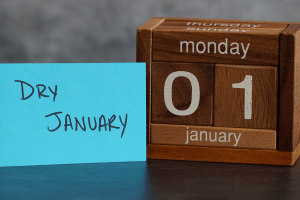Call the right play during the Big Game

The football playoffs are here and the Big Game is one of the biggest sporting events in the United States. This is the day that many people will get together with family and friends to root for their team. Since drinking alcohol is a part of the game plan for many people, it is a good time to be mindful of how it can affect your celebrations and your health.
During the Big Game, some people may binge drink. Binge drinking is a pattern of drinking that brings blood alcohol concentration (BAC) to 0.08 percent—which is the legal limit for driving in the United States—or higher. This typically occurs after 4 drinks for women and 5 drinks for men in about 2 hours. Some people may engage in high-intensity drinking, which is consuming 2 or more times these amounts.
Binge drinking is dangerous, and it has many serious safety risks. It can lead to unintentional injuries from car crashes, falls, and alcohol overdoses, which can result in death. Binge drinking increases the chances of committing or experiencing crimes, including assaults and theft. People who binge drink are also more likely to engage in unsafe sexual practices which increase risks for sexually transmitted infections and unintentional pregnancies.
Another common consequence of excessive alcohol use is hangovers. During a hangover, attention, decision-making, and muscle coordination can all be impaired. Also, the ability to perform important tasks, such as driving and operating machinery can still be negatively affected. There is no magic remedy for a hangover—only time can cure it. The only real prevention for hangovers is to keep alcohol intake to a minimum or to not drink at all.
It’s important to note that drinking even small amounts of alcohol can pose risks to your health under certain conditions. For example, drinking any amount can be a problem if you have a chronic health condition such as high blood pressure or diabetes. In addition, some medications interact badly with alcohol, making them not work properly or making them dangerous or even deadly. These medications include aspirin, acetaminophen, cold and allergy medicines, cough syrup, sleeping pills, narcotic pain medications, anxiety or depression medicines as well as some herbal remedies. Since these medications can take time to clear the body, problems can occur even if they are taken several hours before or after consuming alcohol. Finally, a BAC of 0.08 is not a magic number; at a BAC less than 0.08 percent, impairments in memory, attention, coordination, and balance can occur that may put people at risk for unintentional injuries.
Meanwhile, individuals who don’t typically drink much alcohol or who are not familiar with the alcohol content of certain alcoholic beverages may indulge more than usual during the Big Game and other major sporting events. As a result, they may underestimate their level of alcohol consumption and not recognize their level of impairment, leading to potentially hazardous situations.
During the Big Game, be mindful of how much alcohol constitutes a standard alcoholic drink and how much you are consuming. If you are hosting a party, play defense. Be sure to have plenty of nonalcoholic drinks and snacks available for your guests. Such items can help them stay hydrated and/or slow the absorption of alcohol in the body, thereby reducing the peak alcohol concentration in their blood. Importantly, please take the necessary steps to help ensure your well-being and the safety of your guests.
For more information, visit one of these NIAAA resources:
To access calculators for determining the number of standard drinks in common alcoholic beverages and for tips on cutting down on drinking, visit Rethinking Drinking at: www.rethinkingdrinking.niaaa.nih.gov.
For information about treatment for alcohol use disorder, visit the NIAAA Alcohol Treatment Navigator at https://alcoholtreatment.niaaa.nih.gov/.
Best wishes, GFK
Need Help for an Alcohol Problem?
If you’re having an emergency, call 911. If you are having suicidal thoughts, call 911, go to the nearest emergency room or call the toll-free, 24-hour National Suicide Prevention Lifeline at 1-800-273-TALK (8255) to help you through this difficult time.
The NIAAA Alcohol Treatment Navigator can help you recognize and find high quality treatment for alcohol use disorder. If you drink excessively, seek medical help to plan a safe recovery as sudden abstinence can be life threatening. NIAAA’s Rethinking Drinking can help you assess your drinking habits and provides information to help you cut back or stop drinking.








